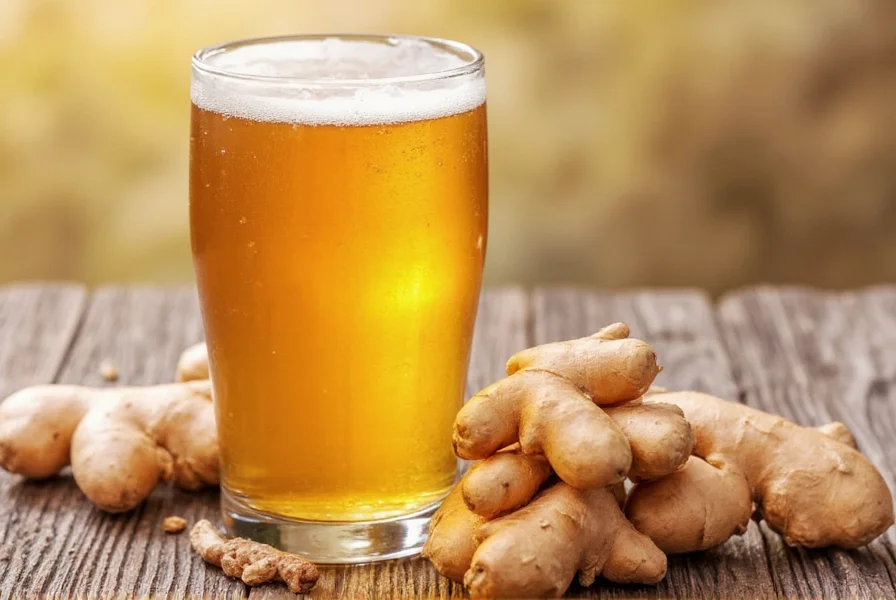Understanding whether ginger beer contains gluten is crucial for individuals managing celiac disease, non-celiac gluten sensitivity, or following a strict gluten-free diet. While the traditional recipe for ginger beer doesn't include any gluten-containing grains, modern commercial production methods vary significantly between brands.
What Makes Ginger Beer Potentially Contain Gluten
Ginger beer's base ingredients—fresh ginger, sugar, water, and yeast—are naturally gluten-free. The potential for gluten contamination comes from:
- Added barley in some traditional brewing processes
- Cross-contamination during manufacturing
- Flavor additives containing malt or wheat derivatives
- Fermentation agents derived from gluten-containing grains
Traditional vs. Modern Ginger Beer Production
Historically, ginger beer was made using a "ginger beer plant" (a symbiotic culture of yeast and bacteria) without any gluten ingredients. Many artisanal and craft producers still follow this traditional method. However, some commercial manufacturers have adapted their processes to include barley malt, which introduces gluten to the final product.
| Production Method | Typically Gluten-Free | Gluten Risk Factors |
|---|---|---|
| Traditional fermentation (ginger beer plant) | Yes | Very low risk if no cross-contamination |
| Modern commercial brewing | Varies by brand | Barley malt, cross-contamination |
| Homemade recipes | Yes (if using pure ingredients) | Depends on ingredient selection |
| "Small batch" craft production | Usually | Check for shared equipment risks |
How to Verify If Your Ginger Beer Is Gluten-Free
For those with gluten-related disorders, simply assuming ginger beer is safe isn't sufficient. Follow these verification steps:
- Read ingredient labels carefully - Look for explicit mentions of barley, wheat, rye, or malt
- Check for gluten-free certification - Third-party certifications provide the highest assurance
- Contact manufacturers directly - Ask about their gluten testing protocols and facility practices
- Research brand policies - Many companies list gluten information on their websites
- Start with small servings - When trying a new brand, test with a small amount first
Gluten-Free Ginger Beer Brands Worth Checking
While this isn't an endorsement of specific products, several brands consistently produce gluten-free ginger beer options that cater to those with dietary restrictions. Always verify current formulations as recipes can change.

Understanding "Gluten-Removed" vs. "Gluten-Free"
A critical distinction exists between products labeled "gluten-free" and those labeled "gluten-removed." For individuals with celiac disease, "gluten-removed" beverages may still contain problematic gluten fragments that standard tests don't detect. The Celiac Disease Foundation recommends avoiding "gluten-removed" alcoholic beverages as they may still cause harm.
Homemade Ginger Beer: The Safest Gluten-Free Option
For complete control over ingredients, making ginger beer at home ensures a truly gluten-free product. A basic recipe requires only:
- Fresh ginger root (peeled and grated)
- Organic cane sugar
- Filtered water
- Ginger beer plant or food-grade yeast
- Lemon juice (optional)
When preparing homemade ginger beer, use dedicated equipment that hasn't been exposed to gluten-containing foods to prevent cross-contamination.
Alcoholic vs. Non-Alcoholic Ginger Beer: Does It Matter?
The alcohol content itself doesn't determine gluten presence. Both alcoholic and non-alcoholic varieties can be gluten-free or contain gluten depending on the production method. Some alcoholic ginger beers use barley in fermentation, while many non-alcoholic versions are naturally gluten-free. Always check the specific product rather than assuming based on alcohol content.

Cross-Contamination Concerns in Production Facilities
Even when ingredients are gluten-free, cross-contamination can occur if the facility also processes gluten-containing products. Manufacturers that produce both gluten-free and gluten-containing beverages on shared equipment pose higher risks. Look for brands that:
- Use dedicated gluten-free production lines
- Conduct regular gluten testing (with published results)
- Follow strict sanitation protocols between production runs
- Clearly label potential cross-contamination risks
Reading Between the Lines: Marketing vs. Reality
Some brands use misleading terms like "crafted with natural ingredients" or "traditional recipe" without addressing gluten content. Don't rely on marketing language—seek explicit gluten information. Phrases like "may contain traces of gluten" or "processed in a facility that also handles wheat" provide valuable warnings for sensitive individuals.
Frequently Asked Questions
Is all ginger beer gluten free?
No, not all ginger beer is gluten free. While traditional recipes are naturally gluten-free, some commercial brands add barley or other gluten-containing ingredients during production. Always check labels or contact manufacturers for confirmation.
Can people with celiac disease drink ginger beer?
People with celiac disease can drink ginger beer only if it's verified gluten-free. Many traditional ginger beers are safe, but some contain barley. Look for products with gluten-free certification and avoid 'gluten-removed' labels, which may still contain harmful gluten fragments.
Does alcoholic ginger beer contain gluten?
Alcoholic ginger beer may or may not contain gluten. The alcohol content itself doesn't determine gluten presence. Some alcoholic versions use barley in fermentation, while others are naturally gluten-free. Always verify the specific product's ingredients and manufacturing process.
How can I make sure my ginger beer is gluten free?
To ensure your ginger beer is gluten free: 1) Check for gluten-free certification labels, 2) Read ingredients for barley, wheat or malt, 3) Contact the manufacturer about their testing protocols, 4) Consider making homemade ginger beer with verified gluten-free ingredients, and 5) Start with small servings when trying new brands.










 浙公网安备
33010002000092号
浙公网安备
33010002000092号 浙B2-20120091-4
浙B2-20120091-4